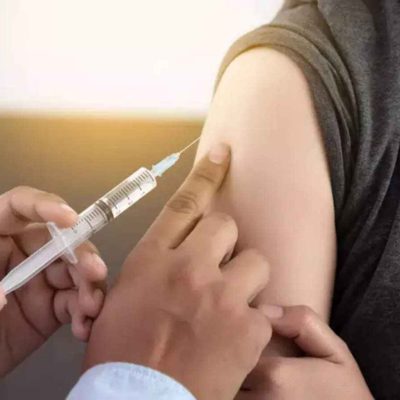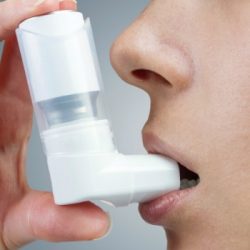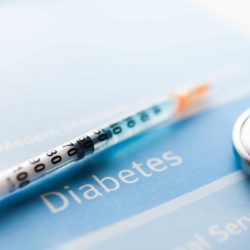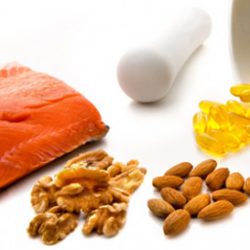A new international study led by researchers at Karolinska Institutet in Sweden shows that AI-based models can outperform human experts at identifying ovarian cancer in ultrasound images. The study is published in Nature Medicine. "Ovarian tumours are common and are often detected by chance," says Professor Elisabeth Epstein at the Department of Clinical Science and … [Read more...]
Sport or Snack? How our Brain Decides
Should I go and exercise, or would I rather go to the café and enjoy a delectable strawberry milkshake? Until now, what exactly happens in our brain when we make this decision has been a mystery to science, but researchers at ETH Zurich have found the solution. They deciphered which brain chemical and which nerve cells mediate this decision: the messenger substance orexin and … [Read more...]
Home Test Reveals The Risk of Heart Attack in Five Minutes
The study, published in Journal of the American Heart Association, uses data from the SCAPIS population study, which is based at the University of Gothenburg, with the Swedish Heart Lung Foundation as its main sponsor. The study was led by Göran Bergström, Professor of Clinical Physiology at Sahlgrenska Academy at the University of Gothenburg, senior physician at Sahlgrenska … [Read more...]
How Stress Knocks Out Your Cognitive Reserve
While mentally stimulating activities and life experiences can improve cognition in memory clinic patients, stress undermines this beneficial relationship. This is according to a new study from Karolinska Institutet published in Alzheimer's & Dementia: The Journal of the Alzheimer's Association. Researchers in the late 1980s found that some individuals who showed no … [Read more...]
Benefits of Adolescent Fitness to Future Cardiovascular Health Possibly Overestimated
There is a well-known relationship between good physical fitness at a young age and a lower risk of cardiovascular disease later in life. However, when researchers adjusted for familial factors by means of sibling analysis, they found a weaker association, although the link between high body mass index (BMI) and cardiovascular disease remained strong. The study, which was … [Read more...]
Antioxidants Stimulate Blood Flow in Tumors
Vitamin C and other antioxidants stimulate the formation of new blood vessels in lung cancer tumours, a new study from Karolinska Institutet published in The Journal of Clinical Investigation shows. The discovery corroborates the idea that dietary supplements containing antioxidants can accelerate tumour growth and metastasis. "We've found that antioxidants activate a … [Read more...]
Exercise Seems to Protect Against Major Brain Hemorrhage
Regular physical activity and exercise may reduce bleeding in individuals with intracerebral hemorrhage, a University of Gothenburg study shows. The researchers emphasize the importance of physical activity to protect the brain. The study, published in the journal Stroke and Vascular Neurology, analyzed data on 686 people treated for intracerebral hemorrhage at Sahlgrenska … [Read more...]
COVID-19 Vaccines Aren’t Strongly Linked to Menstrual Changes, Study Says
While the COVID-19 vaccines have made a dramatic difference in controlling the pandemic, researchers are still learning about the ways that the shots may affect people’s health. One of those questions centers around how the vaccines might impact menstrual cycles. Reports of women experiencing changes in their cycles—either in the intensity and frequency of bleeding, or the … [Read more...]
People with Obesity due to Genetic Predisposition have Lower Risk of Cardiovascular Disease
There has been a global increase in the incidence of overweight and obesity over the past few years. Almost one third of the world's population now liveswith overweight or obesity. "The figure is alarming since it is well-established that a high BMI in middle-age increases the risk of developing cardiovascular disease and other conditions," says Ida Karlsson, assistant … [Read more...]
Youth Overweight a Risk Factor for Blood Clots as Adult
The association between obesity and blood clots is already established. However, to date it has been unclear how much influence a raised BMI in childhood and puberty exerts. The purpose of the study was to clarify the links between BMI in early life and subsequent thrombi. Thrombi usually arise in the legs, often starting in a blood vessel in the calf. Swelling, pain and … [Read more...]
Hydrogel Injection may change the way the heart muscle heals after a heart attack
Researchers at CÚRAM, the SFI Research Centre for Medical Devices based at National University of Ireland Galway, and BIOFORGE Lab, at the University of Valladolid in Spain, have developed an injectable hydrogel that could help repair and prevent further damage to the heart muscle after a heart attack. The results of their research have just been published in the journal … [Read more...]
The link between stress and depression
Researchers at Karolinska Institutet in Sweden have identified a protein in the brain that is important both for the function of the mood-regulating substance serotonin and for the release of stress hormones, at least in mice. The findings, which are published in the journal Molecular Psychiatry, may have implications for the development of new drugs for depression and … [Read more...]
Mammogram screening and high fiber diet help combat breast cancer
The key to spotting breast cancer and reducing the risk of fatal disease is early detection and screening. Diagnosing the illness early on helps improve health outcomes. New research shows that participation in mammography screening substantially reduces the rate of advanced and fatal breast cancer. A team of researchers at Falun Central Hospital in Sweden has … [Read more...]
Skiers have lower incidence of depression and vascular dementia — but not Alzheimer’s
Half as many diagnosed with depression, a delayed manifestation of Parkinson's, a reduced risk of developing vascular dementia -- but not Alzheimer's. These connections were discovered by researchers when they compared 200,000 people who had participated in a long-distance cross-country ski race between 1989 and 2010 with a matched cohort of the general population. The results … [Read more...]
Growth hormone may provide new hope for stroke survivors
Less fatigue and better recovery of cognitive abilities such as learning and memory. These may be the results of growth hormone treatment after a stroke, an experimental study of mice published in the journal Stroke suggests. "We hope that this work can pave the way for clinical studies involving the use of human growth hormone as treatment in the rehabilitation phase … [Read more...]
Revealed! Dense-dose chemotherapy for early breast cancer does not result in significant improvement
Among women with high-risk early breast cancer, the use of tailored dose-dense chemotherapy compared with standard adjuvant chemotherapy did not result in a statistically significant improvement in breast cancer recurrence-free survival, and nonhematologic toxic effects were more frequent in the tailored dose-dense group, according to a study appearing in the November 8 issue … [Read more...]
Get Up On Your Feet Sooner After Hip Fracture
An already available drug can help patients get back on their feet more rapidly after a hip fracture, according to an international study published in the Journal of Bone Joint Surgery. The results suggest that treatment with the drug accelerates the healing process in broken bones. "We have shown that patients are more mobile and suffer less pain after a hip fracture … [Read more...]
Intestinal diversity can prevent asthma
Children who develop asthma or allergies have an altered immune response to intestinal bacteria in the mucous membranes even when infants, according to a new study from Linköping University, Sweden, and Center for Advanced Research in Public Health, Spain. The results also suggests that the mother's immune defence plays a role in the development of asthma and allergies in … [Read more...]
Mannose levels may indicate diabetes risk
Even if you are not overweight, your mannose levels may indicate whether you're at risk for type 2 diabetes (T2D) or insulin resistance (IR), a Swedish study shows. Mannose, a simple sugar that occurs as a component of many natural polysaccharides, has been identified as a biomarker for diabetes, says Adil Mardinoglu, a systems biologist at KTH Royal Institute of … [Read more...]
Gaming and English writing skills linked: A Swedish Study
A new study from Karlstad University, Sweden, reveals that there are positive relations between gaming and English writing skills. The study focused on essays that students wrote in 9th grade as part of the national test in English. Pia Sundqvist, associate professor in English at Karlstad University, investigated how Swedish teenagers who play computer games performed on … [Read more...]
Obesity more dangerous than lack of fitness: A Swedish Study
A new study, published today in the International Journal of Epidemiology , has dismissed the concept of 'fat but fit'. In contrast, the results from the new study suggest that the protective effects of high fitness against early death are reduced in obese people. Although the detrimental effects of low aerobic fitness have been well documented, this research has largely … [Read more...]
Low-carbohydrate diet reduced inflammation: A Swedish Study
A low-carbohydrate diet, but not a low-fat diet, reduces inflammation in patients with type 2 diabetes, according to research at Linköping University in Sweden. It is known that patients with type 2 diabetes have higher levels of inflammation than those who do not have the disease, and it is believed that this may contribute to a higher risk of cardiovascular disease and … [Read more...]
Bariatric surgery health benefits: A Swedish Study
Bariatric surgery has positive effects not only on weight loss but also on diabetes and heart disease. Researchers at the Sahlgrenska Academy and University of Cincinnati have shown that the health benefits are not caused by a reduction in the stomach size but by increased levels of bile acids in the blood. These findings, reported in Nature, indicate that bile acids could be a … [Read more...]
Hypersexual disorder linked to overactive stress systems: A Swedish Study
New research from Karolinska Institutet in Sweden shows that hypersexual disorder -- known popularly as sex addiction -- can be linked to hyperactive stress systems. In a stress regulation test using the cortisone drug dexamethasone, men with hypersexual disorder showed higher levels of stress hormones than controls, a finding that the researchers hope will contribute to … [Read more...]
Lifestyle a risk factor for celiac disease: A Swedish Study
Celiac disease incidence has increased among Swedish children between 2 to 15 years. The significant escalation in celiac disease can be associated with planned caesarean sections, urinary tract infections during pregnancy, season of birth and being born in south Sweden. This according to a dissertation from Umeå University in Sweden. The results of the dissertation show … [Read more...]
Anti-stress hormone may provide indication of breast cancer risk: A Swedish Study
A new study from Lund University in Sweden shows that women with low levels of an anti-stress hormone have an increased risk of getting breast cancer. The study is the first of its kind on humans and confirms previous similar observations from animal experiments. The recent findings on a potential new marker for the risk of developing breast cancer are presented in the … [Read more...]
Neurotoxin found in commercial seafood: A Swedish Study
Popular commercial seafood purchased from Swedish supermarkets at the Stockholm region contains Beta-Methylamino-L-Alanine (BMAA), shows a doctoral thesis from Stockholm University. BMAA is a naturally-occurring amino acid with a possible link to neurodegenerative diseases such as Parkinson's disease, Alzheimer's disease and Amyotrophic lateral sclerosis. It is the first … [Read more...]
Omega-3 dietary supplements pass blood-brain barrier: A Swedish Study
New research from Karolinska Institutet in Sweden shows that omega-3 fatty acids in dietary supplements can cross the blood brain barrier in people with Alzheimer's disease, affecting known markers for both the disease itself and inflammation. The findings are presented in the Journal of Internal Medicine, and strengthen the evidence that omega-3 may benefit certain forms of … [Read more...]
The infant gut microbiome: New studies on its origins and how it’s knocked out of balance: A Swedish Study
A fecal sample analysis of 98 Swedish infants over the first year of life found a connection between the development of a child's gut microbiome and the way he or she is delivered. Babies born via C-section had gut bacteria that showed significantly less resemblance to their mothers compared to those that were delivered vaginally. The study, which appears May 11 in Cell Host … [Read more...]
Key protein may affect risk of stroke: A Swedish Study
Studies on mice reveal that a special protein in the brain's tiniest blood vessels may affect the risk of stroke. Peter Carlsson, professor in genetics at the University of Gothenburg, and his research team are publishing new research findings in the journal Developmental Cell about how the blood-brain barrier develops and what makes the capillaries in the brain different from … [Read more...]





























